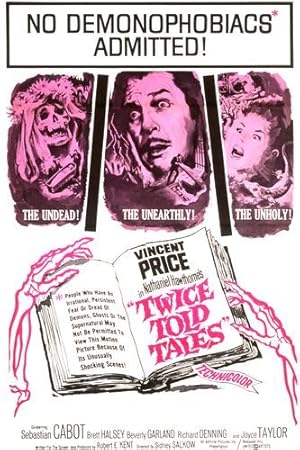
Twice Told Tales Page #4
- APPROVED
- Year:
- 1963
- 120 min
- 100 Views
If this is some
hideous prank--
No, Sylvia, no.
It's just that something
very strange has happened.
Sylvia.
Have you
no recollection
of the sudden illness
that struck you
on the night
we were to be married?
That was just
a few hours ago.
I was feeling weak
and tired, but
I'm all right now.
You died.
You have been dead
for 38 years.
Dead?
38 years?
He's insane!
You died, Sylvia.
You've been dead
for 38 years.
1859?
Alex, tell me
he's mad.
No, Sylvia,
it's the truth.
I haven't changed.
And both of you,
the years haven't
changed you either.
That's thanks
to a miracle
that was made known
to us this very evening.
What are you
talking about?
Please,
come sit down.
This evening,
we found
a peculiar liquid
dripping from
the ceiling of your crypt.
After testing it,
we learned
that it had the power
Since you'd been
preserved by it,
we were able to bring
you back to the living.
Carl,
is this true?
Oh, it's as true as heaven
and earth, my love.
I can stay alive?
Forever?
Oh, forever.
Oh, darling,
if you only knew
how much I've loved
you all these years.
How I've cherished
your memory
and could dream
You never married?
There's never been
another woman.
We can still be married,
as if nothing had happened.
Nothing can
stop us now.
Darling, I saved
your wedding dress.
You didn't.
I'll get it
for you.
May I get
something for you?
Would you care
for some wine?
Is it good wine, Alex?
Such as we had
yesterday?
That yesterday
of 38 years ago, of course.
Please, Sylvia.
When we had our
final argument.
Sylvia, please.
He'll hear you.
Don't let him know.
And what of
my heart, Alex?
You had no conscience
about that, did you?
I loved you,
you know that.
Love?
To take all a woman
has to offer,
and then refuse
to marry her:
Is that your idea of love?
You know how I felt
about marriage
from the beginning.
I loved you,
but I wanted to be free.
You gave
yourself to me.
Are you trying to say
that I seduced you?
Do you think
you would've been happy
marrying him
to spite me?
I wanted to
be your wife, not
just another woman.
If only you had
loved me enough.
Isn't it love enough
that a man would
murder for you?
Murder?
Do you know
why you became ill
so suddenly the night
before your wedding?
I poisoned you.
in the arms of another man?
But you insisted
on mocking me,
You forced me to do
what I had to do.
All right.
Maybe I was wrong
to have that much pride,
but we could be
married now.
Translation
Translate and read this script in other languages:
Select another language:
- - Select -
- 简体中文 (Chinese - Simplified)
- 繁體中文 (Chinese - Traditional)
- Español (Spanish)
- Esperanto (Esperanto)
- 日本語 (Japanese)
- Português (Portuguese)
- Deutsch (German)
- العربية (Arabic)
- Français (French)
- Русский (Russian)
- ಕನ್ನಡ (Kannada)
- 한국어 (Korean)
- עברית (Hebrew)
- Gaeilge (Irish)
- Українська (Ukrainian)
- اردو (Urdu)
- Magyar (Hungarian)
- मानक हिन्दी (Hindi)
- Indonesia (Indonesian)
- Italiano (Italian)
- தமிழ் (Tamil)
- Türkçe (Turkish)
- తెలుగు (Telugu)
- ภาษาไทย (Thai)
- Tiếng Việt (Vietnamese)
- Čeština (Czech)
- Polski (Polish)
- Bahasa Indonesia (Indonesian)
- Românește (Romanian)
- Nederlands (Dutch)
- Ελληνικά (Greek)
- Latinum (Latin)
- Svenska (Swedish)
- Dansk (Danish)
- Suomi (Finnish)
- فارسی (Persian)
- ייִדיש (Yiddish)
- հայերեն (Armenian)
- Norsk (Norwegian)
- English (English)
Citation
Use the citation below to add this screenplay to your bibliography:
Style:MLAChicagoAPA
"Twice Told Tales" Scripts.com. STANDS4 LLC, 2024. Web. 6 May 2024. <https://www.scripts.com/script/twice_told_tales_22389>.


Discuss this script with the community:
Report Comment
We're doing our best to make sure our content is useful, accurate and safe.
If by any chance you spot an inappropriate comment while navigating through our website please use this form to let us know, and we'll take care of it shortly.
Attachment
You need to be logged in to favorite.
Log In